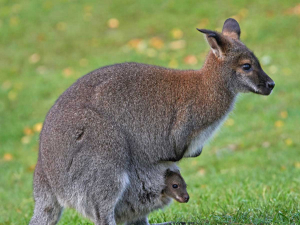Biosecurity NZ urges vigilance for yellow-legged hornets
Biosecurity New Zealand says Kiwis should continue to keep an eye out for yellow-legged hornets (Vespa velutina) over the holiday season.
 Biosecurity NZ has launched a new campaign targeting wallabies. Photo Credit: Ministry for Primary Industries.
Biosecurity NZ has launched a new campaign targeting wallabies. Photo Credit: Ministry for Primary Industries.
Wallaby populations continue to grow in New Zealand, something which has prompted the launch of the first national awareness campaign.
The Tipu Mātoro: Wallaby-free Aotearoa is designed to shine a light on the extensive damage wallabies can wreak on the environment, asking Kiwis to report wallaby sightings.
John Walsh, Biosecurity New Zealand’s director of response says wallabies silently prey on the futures of forests and farms.
“We are working in partnership with regional councils, local iwi, farmers and landowners through Tipu Mātoro to manage and reduce populations, but we need everyone’s help.”
Walsh says estimates set the wallaby population at more than one million. However, because the animals are nocturnal and good at hiding, public reports are one of the best ways to manage the spread.
With no natural predators, two introduced species are causing millions in damage each year – the dama wallaby in Rotorua, and the Bennett’s wallaby in Canterbury and North Otago.
“If left unchecked, by 2025 wallabies would cost New Zealanders around $84 million a year in damage and over the next 50 years, they could spread through a third of the country,” Walsh says.
“Wallabies graze on bush undergrowth, and, when moving into an area, can quickly decimate new shoot growth, destroying our native species' habitats and food sources. What were once lush forest understories turn into barren wastelands, meaning that in the coming years our native bush won’t regenerate.
“And their impacts are felt beyond our native bush. They compete with livestock for food, damage fences, foul up pastures preventing it from being a food source, eat planted forest seedlings and contribute to erosion and poor water quality.”
Walsh says the campaign is part of the Tipu Mātoro: Wallaby-free Aotearoa Programme, which focuses first on stopping the spread of wallabies from known areas in the Bay of Plenty/Waikato and in South Canterbury/North Otago.
“By targeting populations outside these containment zones and following up on reported wallaby sightings, the programme can prevent new populations establishing elsewhere in Aotearoa.”
The programme is also undertaking the significant research required to understand wallaby behaviour in a New Zealand context, supporting effective containment and control.
To report a wallaby sighting, head to http://www.reportwallabies.nz/
Fonterra’s impending exit from the Australian dairy industry is a major event but the story doesn’t change too much for farmers.
Expect greater collaboration between Massey University’s school of Agriculture and Environment and Ireland’s leading agriculture university, the University College of Dublin (UCD), in the future.
A partnership between Torere Macadamias Ltd and the Riddet Institute aims to unlock value from macadamia nuts while growing the next generation of Māori agribusiness researchers.
A new partnership between Dairy Women’s Network (DWN) and NZAgbiz aims to make evidence-based calf rearing practices accessible to all farm teams.
Despite some trying circumstances recently, the cherry season looks set to emerge on top of things.
Changed logos on shirts otherwise it will be business as usual when Fonterra’s consumer and related businesses are expected to change hands next month.